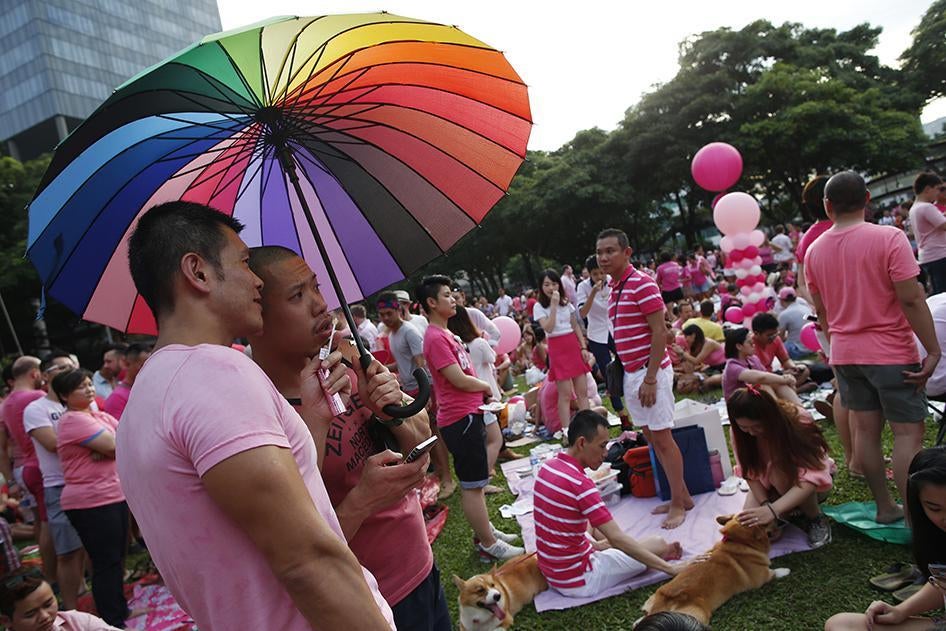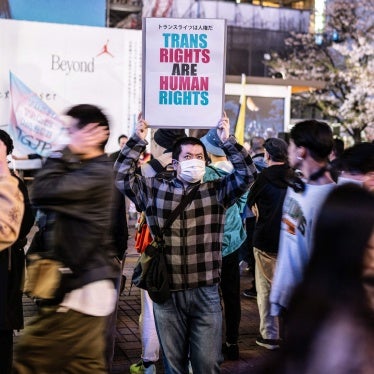Recent moves by Singapore's government to change its notoriously narrow public order law to further restrict free speech came as no surprise. But the specificity and persistence of the moves by the country's home affairs ministry -- first, in June, a warning to corporations that sponsor a gay-themed gathering, and from Nov. 1 the imposition of a new bureaucratic hurdle for event sponsorship -- is peculiar for a city-state keen on projecting a reputation for welcoming international business.
The new restriction, which requires companies that are not "Singapore entities" -- meaning they are not incorporated in Singapore and do not have a majority of Singapore citizens on their board -- appears to be aimed at corporate sponsorship of Pink Dot, an annual gathering that, since 2009, has brought together Singapore citizens and permanent residents to express support for lesbian, gay, bisexual, and transgender (LGBT) people. Since its inception, the event's organizers have been meticulous in registering the gathering and ensuring that all their announcements and regulations fall within Singapore's public assembly laws.
In 2011, Google Singapore became the first international company to sponsor the event -- explaining that it matched Google's corporate values of diversity and acceptance. This year, Pink Dot counted 18 corporate sponsors, all of which are legally registered entities in Singapore, including names such as Barclays, Twitter, JPMorgan, General Electric, and BP.
Under Singapore's Public Order Act 2009, the government requires a permit for any cause-related assembly in any public place or to which members of the general public are invited. Grounds for denial of the permit are broad and left largely to the discretion of police.
Demonstrations and rallies are restricted to the "Speakers' Corner," a designated "free speech area" in Hong Lim Park, require advance notice, can only be organized by Singaporean citizens, and are open only to citizens and permanent residents.
Singapore is home to a growing number of international companies -- including multinational corporations such as Bloomberg, Goldman Sachs, Visa, and Microsoft -- that recognize LGBT rights and have incorporated them into their corporate non-discrimination policies. Pink Dot was organized within the boundaries of Singaporean law, and garnered the support of local branches of those multinationals. Yet immediately after this year's Pink Dot in June, Home Affairs Minister K. Shanmugam issued a statement that "foreign entities should not interfere in our domestic issues, especially political issues or controversial social issues with political overtones," adding that LGBT issues are "one such example."
The government's response to Pink Dot effectively encourages corporations to engage in anti-LGBT discrimination. Some of the sponsors immediately responded by reaffirming their commitment to LGBT inclusion. Even after the new restrictions, which further entangles Pink Dot in a bureaucratic and legal tangle by requiring each MNC sponsor to apply for a sponsorship permit, some companies have already indicated they will continue to apply to sponsor the event.
The corporations that sponsor Pink Dot employ Singaporeans, follow Singapore's laws, and contribute to Singapore's economy. They have human rights responsibilities and should not be pressured to support discrimination against the LGBT community.
Divergent Approaches
A September 2016 report by the Center for Talent Innovation, a corporate talent think tank, sponsored by nearly a dozen MNCs, ranked Singapore as "hostile" to LGBT people. Other Asian economic capitals competing for investment from such multinationals are heading in markedly different directions.
In Japan, the annual Tokyo Rainbow Pride has attracted sponsors from entertainment, financial services, and retail industries. This year, within weeks of Singapore's decision to restrict Pink Dot, 30 companies in Tokyo, including IBM, Panasonic and Sony, announced standards for making workplaces more welcoming to LGBT employees.
Hong Kong has played host to a major annual corporate LGBT summit since 2013, and the chairperson of the government's Equal Opportunities Commission in 2016 stated: "Discriminatory treatment on the basis of sexual orientation, gender identity, and intersex status has no place in an international city and business center such as Hong Kong", because it can "hurt the city's ability to attract and retain talent, as well as our longstanding reputation as an open and welcoming society."
Singapore, which has gone to great lengths to encourage international companies to set up regional headquarters in the country, should also recognize the negative message that such restrictions send to the growing number of companies that recognize LGBT rights and have incorporated them into their corporate non-discrimination policies.
Ultimately, Singapore's negative stance will create a competitive disadvantage for the country against other regional capitals such as Tokyo and Hong Kong that embrace diversity and inclusion. Such behavior by the government exposes a brittle understanding of the "peace and harmony" and "common humanity" the government claims to promote. Allowing businesses to express their support for tolerance and diversity by sponsoring an already restricted event is not only a human rights issue, it is a commercial issue. The growing clout of the LGBT consumer market has been matched by corporate moves to express support for basic free expression and assembly rights. Singapore should take note, and allow Pink Dot to continue -- and even grow.









